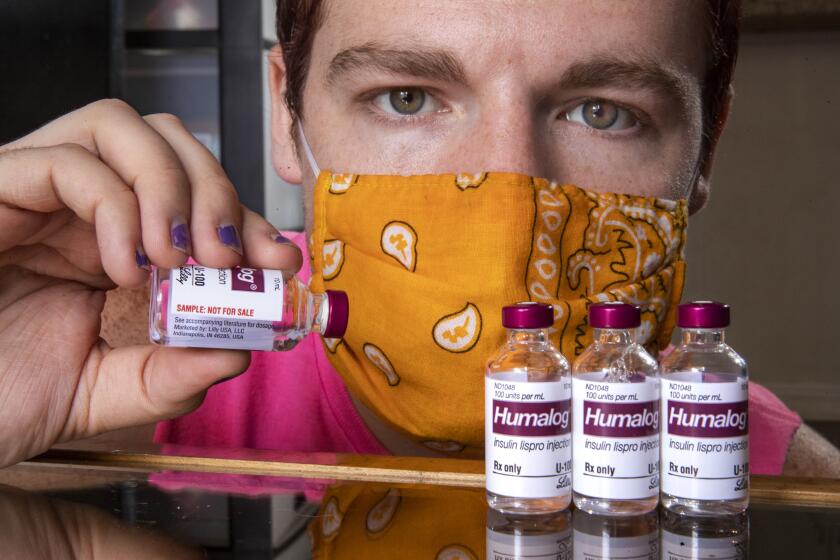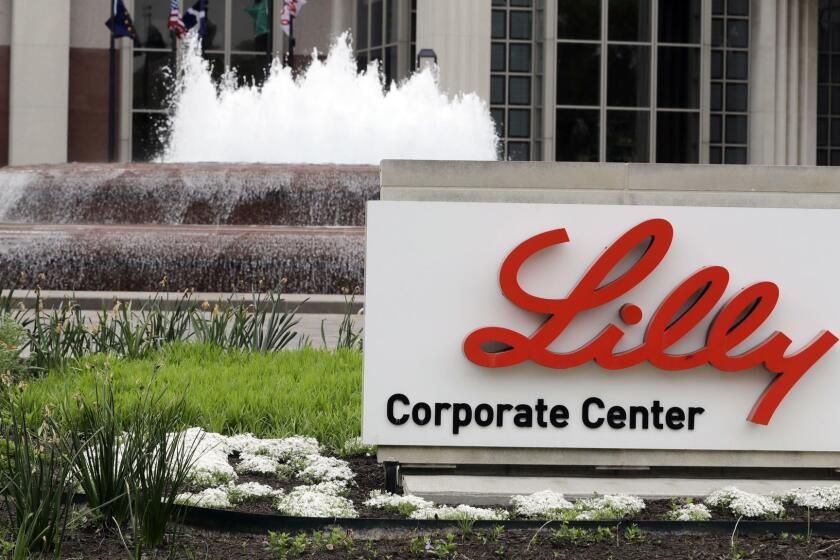California Department of Justice suing pharmaceutical companies over high insulin costs

- Share via
The California Department of Justice is suing three of the nation’s largest insulin makers over the high cost of the drug, which diabetics need to survive.
At a news conference Thursday announcing the lawsuit against Eli Lilly, Sanofi and Novo Nordisk, California Atty. Gen. Rob Bonta said the companies are finding ways to “aggressively hike” the price of insulin at the expense of many patients.
The lawsuit, which was filed under the state’s unfair-competition law, also includes pharmacy benefit managers CVS Caremark, Express Scripts and OptumRx as defendants. The companies serve as intermediaries between insurance and pharmaceutical companies.
“No company is too big to skirt the law or too large to be held accountable,” Bonta said. “Big Pharma might negotiate drug prices, but as your attorney general, let me be unequivocally clear. On my watch, the health and the well-being of Californians is nonnegotiable.”
Arkansas, Kansas and Mississippi have filed similar lawsuits against the three insulin makers and some pharmacy benefit managers. In California, Gov. Gavin Newsom announced last year that the state planned to manufacture its own insulin and offer it at below-market prices.
Newsom wants to spend $100 million to make insulin affordable to millions with diabetes under a new generic drug label, CalRx. What will it cost?
In its lawsuit, the state is seeking remedies that include barring the companies from overcharging patients and restitution for Californians who overpaid for insulin.
Bonta said he hopes the lawsuit will help push the price of insulin “much closer to the cost for production.”
A 2020 Rand Corp. report found that the average manufacturer list price for a standard unit of insulin in the U.S. was $98.70. In Canada the manufacturer price was an average of $12, and in the United Kingdom it was an average of $7.52.
In an emailed statement, a spokesperson for Eli Lilly said that the company “is disappointed by the California Attorney General’s false accusations.”
Patients can purchase a monthly supply of insulin from Eli Lilly for $35 or less, even if they are uninsured, said the spokesperson, Daphne Dorsey. She added that “the average monthly out-of-pocket cost for Lilly insulin is $21.80, a 44 percent decrease over the last five years.”
Anyone paying more than $35 a month can call the company’s Diabetes Solution Center or go to insulinaffordability.com, Dorsey said.
Phil Blando, a spokesperson from CVS Caremark, said in an emailed statement that “pharmaceutical companies alone set the list price for their products.”
“Allegations that we play any role in determining the prices charged by manufacturers are false,” Blando said. “We plan to vigorously defend against this complaint.”
Isaac Sorensen, a spokesperson for Optum Rx, said in an emailed statement that pharmacy benefit managers work to reduce drug costs and that the company “welcomes the opportunity to show the California Office of the Attorney General, just as it has with other [states’] Attorneys General, how we work every day to provide people with access to affordable drugs, including insulin.”
Nationwide, about 34 million people have diabetes. According to the Centers for Disease Control and Prevention, about 5 to 10% have type 1 diabetes and need insulin to manage their blood sugar levels.
Drug maker Eli Lilly & Co. will offer a half-price version of its blockbuster insulin, becoming one of the first companies to effectively cut the price of a top-selling drug amid the ongoing U.S. debate over pharmaceutical costs.
The CDC’s advice to patients includes asking a doctor for a generic version of insulin and contacting the drug companies about patient assistance programs.
Some people who can’t afford insulin take smaller doses than prescribed or buy it on the black market.
Kevin Wren, the outreach lead of the California chapter of #Insulin4All, said he often helps people find insulin so they do not have to ration.
“I’ve had ketoacidosis, I’ve been hospitalized, have had complications, all because I ration my insulin,” Wren said. “This shouldn’t happen.”
More to Read
Sign up for Essential California
The most important California stories and recommendations in your inbox every morning.
You may occasionally receive promotional content from the Los Angeles Times.













